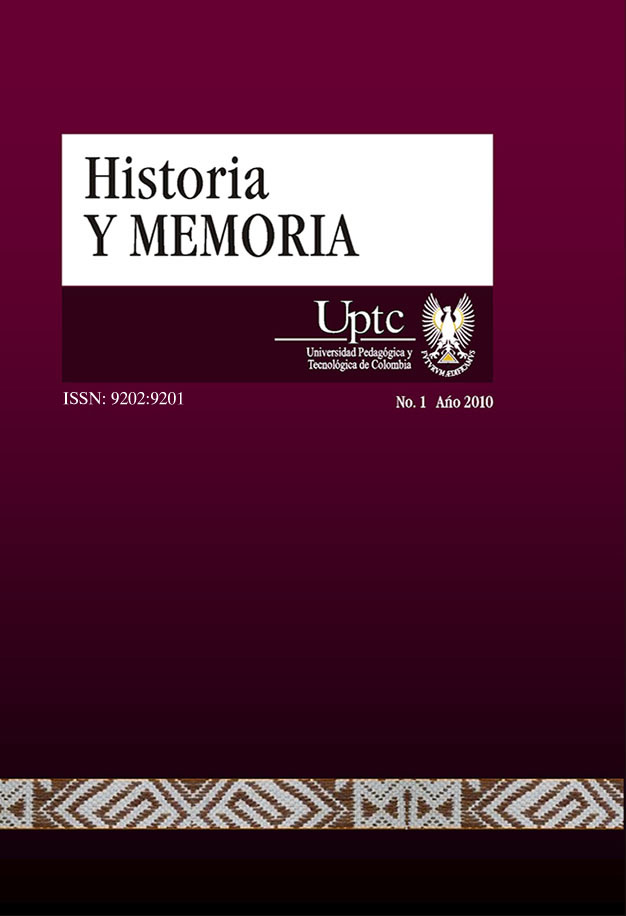Reflections on the impact of “la patria Boba”, the independence of Tunja and its province 1810-1815

Abstract
This article aims at reflecting on the first stage of the process of emancipation, developed since 1810 which is considered the starting point of a political project. Building up this project was not easy, it entailed frictions among different political intensions. On this assert we mean the federalism and the idea of the centralism which originated a great disorganization of political and civil elements and the break down and anarchy of six or seven republics apparently linked by a federal pact and a few provinces which defended the peninsular power.
The provinces in the interior of the country faced situations of instability in their political life, born from the indecision to choose a unique criterion in terms of the political and administrative management of their territories. Referring to the Federal government adopted in the province of Tunja, it is emphasized on the necessity of promoting the total independence from the Spaniard system, due to the poverty of the people, the lack of public schools and the need of fomenting agricultural production and trade. However, this political project did not reach the goals its leaders estimated, first because the participation of the ‘criollos’ in the public administration was not as easy as expected. The second reason was that, as a result of the segregation of the provinces, a crisis was evidenced when the unified basis of tax collection stopped working. The third issue was due to the fact that territorial segregation became one of the greatest difficulties for the correct political-administrative organization, it is necessary to highlight that the join of some towns, and sometimes complete regions from one province to the other, made difficult tax collection.
Keywords
Independence, Patria Boba, province of Tunja, Revolution, Centralism, Federalism.
Author Biography
Juan Manuel Robayo
Licenciado en Ciencias Sociales y Económicas de la Universidad Pedagógica y Tecnológica de Colombia; Magíster en Historia de la Universidad Pedagógica y Tecnológica de Colombia y Especialista Computación para la docencia. Universidad Antonio Nariño.
References
- Archivo Regional de Boyacá – Fondo Archivo Histórico de Tunja (ARB-AHT), Tunja, Año 1810. Vol. I, 17 de Enero de 1810 y Enero 8 de 1810.
- Archivo Regional de Boyacá – Fondo Archivo Histórico de Tunja. Año 1813. Vol. II, No. 35. Marzo 27 de 1813
- Archivo Regional de Boyacá – Fondo Archivo Histórico de Tunja. Año 1814. Vol. III, julio 10 de 1814 y Año 1814.
- Archivo Regional de Boyacá – Fondo Archivo Histórico de Tunja. Vol. IV, No. 247, noviembre 30 de 1814.
- Archivo Regional de Boyacá – Fondo Archivo Histórico de Tunja. Vol. IV, No. 257, noviembre 22 de 1815.
- Archivo Regional de Boyacá – Fondo Archivo Histórico de Tunja. Vol. II, No. 101, Abril22 de 1810
- Archivo Regional de Boyacá – Fondo Archivo Histórico de Tunja. Vol. V, No. 156, octubre 19 de 1813
- Archivo Regional de Boyacá – Fondo Archivo Histórico de Tunja. Vol. III, No. 96, junio 22 de 1815
- Archivo Regional de Boyacá – Fondo Archivo Histórico de Tunja. Año 1811. Vol. II, No. 129, noviembre 24 de 1811.
- Archivo Regional de Boyacá – Fondo Archivo Histórico de Tunja. Vol. IV, No. 215, septiembre 28 de 1814.
- Archivo Regional de Boyacá – Fondo Archivo Histórico de Tunja. No. 225, octubre 20 de 1814.
- Archivo Regional de Boyacá – Fondo Archivo Histórico de Tunja. No. 210, septiembre 23 de 1810 y Año 1815.
- Archivo Regional de Boyacá – Fondo Archivo Histórico de Tunja. Vol. II, No. 233, mayo 2 de 1815.
- Archivo Regional de Boyacá – Fondo Archivo Histórico de Tunja. Vol. III, No. 92, junio 19 de 1815.
- Leyes de: 20 de abril de 1850, 18 de mayo de 1850, 14 de mayo de 1851, 27 de mayo de 1851, 15 de junio de 1853, 20 de junio de 1853 y 9 de septiembre de 1861.
- Declaración de Independencia de la Provincia de Tunja. En: Academia Colombiana de Historia. Boletín de Historia y Antigüedades. Año IX, No. 100, Enero 1914.
- Academia Colombiana de Historia. Boletín de Historia y Antigüedades. Año IX, No. 100, Enero 1914. Bogotá.
- Archivo Regional de Boyacá – Fondo Archivo Histórico de Tunja (ARB-AHT), Tunja.
- Cruz Santos, Abel. Economía y Hacienda Pública. En: Academia Colombiana de Historia. Historia Extensa de Colombia. Vol. XV, T. I-II, Bogotá: Lerner, 1965.
- García Zamudio, Nicolás. Independencia de Tunja. En: Academia Colombiana de Historia. Boletín de Historia y Antigüedades. Bogotá, Nos. 197-204, Enero 1944.
- Samper, José María. Derecho público interno de Colombia. Historia Crítica del Derecho Constitucional Colombiano, desde 1810 hasta 1886. Bogotá: Imprenta de la luz, 1886.
- Serrano Zúñiga, José María. Investigaciones Jurídicas sobre baldíos. Manizales: Casa Editorial Arturo Zapata, 1936.
- Uribe de Hincapié, María Teresa y Álvarez Gaviria, Jesús María. El proceso de apropiación de la tierra en Colombia: 1821-1850.
- Una perspectiva regional para el análisis. Lecturas de Economía. Medellín, 16: 63-54, Enero-Abril, 1985.
- Zuleta, Estanislao. La tierra en Colombia. Medellín: Oveja Negra, Cuaderno No. 6, 1973.